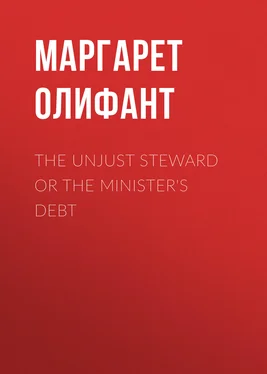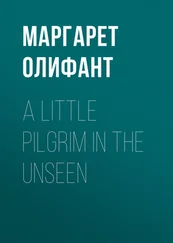Маргарет Олифант - The Unjust Steward or The Minister's Debt
Здесь есть возможность читать онлайн «Маргарет Олифант - The Unjust Steward or The Minister's Debt» — ознакомительный отрывок электронной книги совершенно бесплатно, а после прочтения отрывка купить полную версию. В некоторых случаях можно слушать аудио, скачать через торрент в формате fb2 и присутствует краткое содержание. Издательство: Иностранный паблик, Жанр: foreign_prose, literature_19, foreign_antique, на английском языке. Описание произведения, (предисловие) а так же отзывы посетителей доступны на портале библиотеки ЛибКат.
- Название:The Unjust Steward or The Minister's Debt
- Автор:
- Издательство:Иностранный паблик
- Жанр:
- Год:неизвестен
- ISBN:нет данных
- Рейтинг книги:3 / 5. Голосов: 1
-
Избранное:Добавить в избранное
- Отзывы:
-
Ваша оценка:
- 60
- 1
- 2
- 3
- 4
- 5
The Unjust Steward or The Minister's Debt: краткое содержание, описание и аннотация
Предлагаем к чтению аннотацию, описание, краткое содержание или предисловие (зависит от того, что написал сам автор книги «The Unjust Steward or The Minister's Debt»). Если вы не нашли необходимую информацию о книге — напишите в комментариях, мы постараемся отыскать её.
The Unjust Steward or The Minister's Debt — читать онлайн ознакомительный отрывок
Ниже представлен текст книги, разбитый по страницам. Система сохранения места последней прочитанной страницы, позволяет с удобством читать онлайн бесплатно книгу «The Unjust Steward or The Minister's Debt», без необходимости каждый раз заново искать на чём Вы остановились. Поставьте закладку, и сможете в любой момент перейти на страницу, на которой закончили чтение.
Интервал:
Закладка:
“Papa’s text is an awfu’ kittle one to-day,” he said. “I wonder if he’ll ding it out.”
“Oh, whisht!” said Elsie, “yon’s not his text; he was never like that before.”
“Then what is it?” said Rodie; but this was a question to which she would give no reply.
As they returned home, towards the twilight, they passed old Mr. Anderson’s house, a large, old-fashioned mansion in the High Street, and gazed wistfully at the lights which already appeared in the upper windows, though it was not dark, and which looked strange and alarming to them as if many people were about, and much going on in this usually silent house.
“Does he need so many candles to die by?” said Rodie to his sister.
“Oh, perhaps he is better, and it’s for joy,” said Elsie, taking a more hopeful view.
Their father came out from the door, as they gazed, awe-stricken, from the other side of the street. His head was sunk upon his breast; they had never seen him so cast down before. His aspect, and the fact that he passed them without seeing them, had a great effect upon the children. They went home very quietly, and stole into the house without making any of the familiar noises that usually announced their arrival. However, it cheered them a little to find that their mother was very busy about Willie’s outfit, and that their eldest sister Marion was marking all his new shirts in her fine writing, with the small bottle of marking ink, and the crow quill. The interest of this process and the pleasure of getting possession of the hot iron, which stamped that fine writing into a vivid black, gave a salutary diversion to Elsie’s thoughts. As for Rodie, he was very hungry for his supper, which had an equally salutary effect.
CHAPTER II.
A FRIEND IN NEED
Mr. Buchanan, the minister of St. Leonard’s Church, was a member of a poor, but well-connected family in the West of Scotland, to which district, as everybody knows, that name belongs; and it is not to be supposed that he came to such advancement as a church in a university town all at once. He had married early the daughter of another minister in Fife, and it was partly by the interest procured by her family, and partly by the great reputation he had attained as a preacher, that he had been promoted to his present charge, which was much more important and influential than a mere country parish. But a succession of flittings from manse to manse, even though each new transfer was a little more important than the previous one, is hard upon a poor clergyman’s purse, though it may be soothing to his self-esteem; and St. Leonard’s, though St. Rule was an important port, had not a very large stipend attached to it. Everybody dwelt upon the fact that it was a most important post, being almost indeed attached to the university, and with so large a sphere of influence over the students. But influence is a privilege and payment in itself, or is supposed to be, and cannot be made into coin of the realm, or even pound notes, which are its equivalent. Mr. Buchanan himself was gratified, and he was solemnised, and felt his responsibility as a power for good over all those young men very deeply, but his wife may be forgiven, if she sighed occasionally for a few more tangible signs of the importance of his post. On the contrary, it led them into expenses to which a country minister is not tempted. They had to take their share in the hospitalities of the place, to entertain strangers, to give as seldom as possible, but still periodically, modest dinner-parties, a necessary return of courtesy to the people who invited them. Indeed, Mrs. Buchanan was like most women in her position, the soul of hospitality. It cost her a pang not to invite any lonely person, any young man of whom she could think that he missed his home, or might be led into temptation for want of a cheerful house to come to, or motherly influence over him. She, too, had her sphere of influence; it hurt her not to exercise it freely. Indeed, she did exercise it, and was quite unable often to resist the temptation of crowding the boys up at dinner or supper, in order to have a corner for some protégé . “It was a privilege,” she said, but unfortunately it was an expensive one, plain though these repasts were. “Oh, the siller!” this good woman would say, “if there was only a little more of that, how smoothly the wheels would run.”
The consequence of all this, however, of the frequent removals, of the lapses into hospitality, the appearances that had to be kept up, and, finally, the number of the family, had made various hitches in the family progress. Settling in St. Rule’s, where there was no manse, and where a house had to be taken, and new carpets and curtains to be got, not to speak of different furniture than that which had done so very well in the country, had been a great expense; and all those changes which attend the setting out of young people in the world had begun. For Marion, engaged to another young minister, and to be married as soon as he got a living, there was the plenishing to think of, something more than the modern trousseau, a provision which included all the household linen of the new house; and, in short, as much as the parents could do to set the bride forth in a becoming and liberal manner. And Willie, as has been told, had his outfit for India to procure. These were the days before examinations, when friends—it was a kindly habit superseded now by the changed customs of life—put themselves to great trouble to further the setting out in life of a clergyman’s sons. And William Buchanan had got a writership, which is equivalent, I believe, to an appointment in the Civil Service, by the exertions of one of his father’s friends. The result of these two desirable family events, the provision for life of two of its members, though the very best things that could have happened, and much rejoiced over in the family, brought with them an appalling prospect for the father and mother when they met in private conclave, to consider how the preliminaries were to be accomplished. Where were Willie’s outfit and Marion’s plenishing to come from? Certainly not out of the straightened stipend of the Kirk of St. Leonard, in the city of St. Rule. Many anxious consultations had ended in this, that money must be borrowed in order to make the good fortune of the children available—that is to say, that the parents must put themselves under a heavy yoke for the greater part of their remaining life, in order that the son and the daughter might make a fair and equal start with their compeers. It is, let us thank heaven, as common as the day that such sacrifices should be made, so common that there is no merit in them, nor do the performers in the majority of cases think of them at all except as simple necessities, the most everyday duties of life. It was thus that they appeared to the Buchanans. They had both that fear and horror of debt which is, or was, the accompaniment of a limited and unelastic income with most reasonable people. They dreaded it and hated it with a true instinct; it gave them a sense of shame, however private it was, and that it should be betrayed to the world that they were in debt was a thing horrible to them. Nevertheless, nothing remained for them but to incur this dreadful reproof. They would have to pay it off slowly year by year; perhaps the whole of their remaining lives would be overshadowed by this, and all their little indulgences, so few, so innocent, would have to be given up or curtailed. The prospect was as dreadful to them—nay, more dreadful—than ruin and bankruptcy are to many nowadays. The fashion in these respects has very much changed. It is perhaps the result of the many misfortunes in the landed classes, the collapse of agriculture, the fall of rents; but certainly in our days the confession of poverty is no longer a shame; it is rather the fashion; and debts sit lightly on many shoulders. The reluctance to incur them, the idea of discredit involved in them is almost a thing extinguished and gone.
Читать дальшеИнтервал:
Закладка:
Похожие книги на «The Unjust Steward or The Minister's Debt»
Представляем Вашему вниманию похожие книги на «The Unjust Steward or The Minister's Debt» списком для выбора. Мы отобрали схожую по названию и смыслу литературу в надежде предоставить читателям больше вариантов отыскать новые, интересные, ещё непрочитанные произведения.
Обсуждение, отзывы о книге «The Unjust Steward or The Minister's Debt» и просто собственные мнения читателей. Оставьте ваши комментарии, напишите, что Вы думаете о произведении, его смысле или главных героях. Укажите что конкретно понравилось, а что нет, и почему Вы так считаете.












